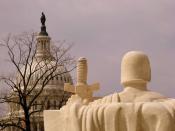David Phillips
U.S. Government
Search & Seizure in the United States
A Non-Partisan Guide
In the Constitution of the United States of America, the Founding Fathers specified, in the first ten amendments, known as The Bill of Rights, specifically in the Fourth Amendment,
"The right of the people to be secure in their persons, houses, papers, and effects, against unreasonable searches and seizures, shall not be violated, and no Warrants shall issue, but upon probable cause, supported by oath or affirmation, and particularly describing the place to be searched, and the persons or things to be seized." (JusticeLearning)
Many people take this for granted, thinking that the meaning of this text is simply that police officers barging into their house and rummaging through their personal belongings will be illegal; however, most people would be surprised to learn the far-reaching implications of this amendment, and how it doesn't apply simply to police officers, but to many other people in their lives.
The main sections of the Fourth Amendment that come under the courts' review are the phrases of person, houses, papers, and effects, unreasonable searches and seizures, and probable cause. Each of the following Supreme Court cases deals with one (or more) of these wordings which are subject to interpretation.
A search and seizure court case in Arizona has been working its way up the judicial ladder for more than six years. In 2003 a 13-year-old junior-high girl, Savana Redding, was accused of having not turned in a bottle of prescription-strength Ibuprofen to the school nurse, and instead allowing it to remain in her possession throughout the day. When school officials learned of this from one of her classmates, they called her to the front office of the school and proceeded to search her belongings, finding nothing...



Very in depth.
Deserves to be accepted, nicely done.
1 out of 1 people found this comment useful.